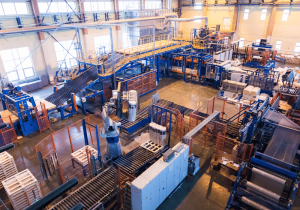In the last decade, the rise of Industry 4.0 technologies, such as the Internet of Things, artificial intelligence, and machine learning, has drastically transformed manufacturing processes across the globe. One of the key concepts born out of this transformation is Smart Manufacturing. What exactly is smart manufacturing, and how is it different from traditional manufacturing techniques? In this post, we will explore smart manufacturing, breaking down its core principles, key benefits, and how it is revolutionizing the manufacturing industry.
Smart Manufacturing Provides Advanced Technology
At its core, smart manufacturing is all about the integration of advanced technologies and data to optimize the manufacturing process. It involves using real-time data to monitor and control the production process in ways that were previously impossible.
 Connect Factory Machines & Systems
Connect Factory Machines & Systems
One of the core principles of smart manufacturing is interconnectivity. When machines, devices, and systems are connected, they can communicate with each other and share valuable data, allowing manufacturers to gain greater visibility and control over their operations. With interconnectivity, manufacturers can track every aspect of the production process and optimize it in real-time.
Collect Useful Manufacturing Data
The use of advanced analytics is also a critical aspect of smart manufacturing. By collecting data from various sources and analyzing it, manufacturers can identify new insights about their operations. Machine learning algorithms can help to identify patterns, anticipate issues, and predict failures long before they happen. These insights can be used to improve processes, reduce waste, and increase efficiency.
 Optimal Automation Processes
Optimal Automation Processes
Another key aspect of smart manufacturing is automation. Automating processes, such as assembly line sorting, weather monitoring, and quality control, can help to reduce errors, speed up production, and reduce costs. Automation can give manufacturers access to more detailed data by collecting information from smart devices and sensors.
Does Smart Manufacturing Affect Metal Fabrication?
Metal fabrication, which includes cutting, shaping, and forming metals into various components and parts, is an important part of manufacturing. Smart manufacturing can improve the metal fabrication process in a number of ways. Automation and data collection can help to monitor and optimize processes, while remote monitoring solutions can track progress from anywhere in the world.
In conclusion, smart manufacturing is revolutionizing the way we make things. By combining advanced technology and data, manufacturers can gain greater visibility and control over their operations. As smart manufacturing continues to mature, we can expect to see it become the cornerstone of modern manufacturing, with its positive impacts felt across countless industries. It’s time to embrace this change, and find new ways to harness the power of smart manufacturing to stay competitive in the modern marketplace.






